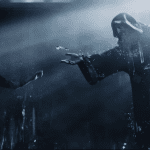
It’s nearly Easter, and when you’re in my curious line of work, that can mean just one thing (professionally speaking): It’s Christian movie season.
Secular theaters are awash in spiritual fare, from Samson to Paul, Apostle of Christ, from I Can Only Imagine to, as of next week, God’s Not Dead – A Light in the Darkness.
And no wonder. The success of I Can Only Imagine shocked the film industry, again showing that faith-based pictures have an audience willing to spend money. More and more quality actors are willing to lend their time and talents to Christian movies. The quality of flicks from Christian studios waxes and wanes, but overall seems to get better by the year.
But.
There’s something missing. Mystery. Magic. Poetry, maybe.
I don’t mean that Christian movies are crying out for a little more iambic pentameter or a few more haikus. What I’m suggesting is that even as Christians are getting better at the craft of moviemaking, the Christian movies we see are still, often, lacking in art. And I think I know why. Art is inherently subversive. Anything that has the ability to move us must have the ability to shake us.
There seems to be little demand for movies that shake us in the Christian subcircles I travel, and as such, our movies seem to fall, simply, into a handful of adaptable templates: The Biblical drama. The inspirational biopic. The angry, vaguely political, us-vs.-them diatribe.
There’s nothing wrong with these templates. They all have a place in the canon of Christian moviemaking, and they can be quite effective. I know a guy who’s seen I Can Only Imagine four times already and cried all four times. That’s powerful stuff, and I don’t want to minimize the power these films have.
But you know what’s interesting to me? Each one of these adaptable templates could be equally, and easily, adapted to the pulpit. And sometimes, despite all the extra tools at the filmmaker’s disposal, the pulpit version is better. The inspirational biopic isn’t so different than someone getting up in church and giving his tearful testimony. I could hear any number of angry screes from a dozen sanctuaries in town. And I’ve known pastors who’ve done far greater justice to Samson’s story than this year’s movie did.
Christian movies range from bad to fine to pretty darn good. But I’ve yet to see a truly great one from an explicitly Christian moviehouse. And that’s in part because today’s Christian storytellers are only scratching the surface of what story can be. What movies could and should be.
We’re great at offering testimonies. But we’re missing the poetry.
I love the book of Job. Not because of its message, but its language.
Who shut up the sea behind doors
when it burst forth from the womb,
when I made the clouds its garment
and wrapped it in thick darkness,
when I fixed limits for it
and set its doors and bars in place … (Job 38:8-10, NIV)
Throughout the history of Christendom, we’ve been blessed with incredible storytellers who took timeless truths and told them in new, breathtaking ways, harnessing the intrinsic power of language to touch the hem of heaven. From Milton to Madeleine L’Engle, from Dostoyevsky to Flannery O’Connor, from G.K. Chesterton to C.S. Lewis. There are passages in The Chronicles of Narnia—a series of childrens’ books, for goodness’ sakes, that I read when I was 9—that feel both so true and so beautiful that I feel like my heart might stop beating from simply reading them.
Christianity’s house is so blessed with artists and creators that it’s practically littered with them: Rembrandt and Bosch and El Greco; Bach, Beethoven and Brahms. To L’Engle, art itself was a sacred act, and the act of creating it was, in a way, honoring the Creator—whether the artist knew it or not.
To the nonbeliever, the person who sees no cosmos in chaos, we are all the victims of the darkness which surrounds our choices; we have lost our way; we do not know what is right and what is wrong; we cannot tell our left hand from our right. There is no meaning. But to serve any discipline of art, be it to chip a David out of an unwieldy piece of marble, to take oils and put a clown on canvas, to write a drama about a young man who kills his father and marries his mother and suffers for these actions, to hear a melody and set the notes down for a string quartet, is to affirm meaning, despite all the ambiguities and tragedies and misunderstandings which surround us.
So why do Christian movies sometimes feel flat and uninspired? Even cynical?
We can blame any number of culprits. Studios, eyes squarely on the bottom line and who shove their products through committees and focus groups—rarely a place to find great art. And let’s blame we faith-based moviegoers, too, who feel all-too fickle and wildly disinterested in anything that might challenge us. Just look at Silence—a beautiful, profound and extraordinarily difficult film made by Martin Scorsese, one of the industry’s greatest creators and a sincere Catholic. just $7 million in theaters.
But sometimes I wonder whether the industry has lost its capacity to dream. To dare to truly contemplate the wonder and mystery and terror embodied in our all-powerful Creator, the One who told Moses that, if he looked Him squarely in the face, he would surely die. To see God in the sun and storm, to feel Him in the music of the cosmos.
It’s interesting how many Christian movies are based on true stories—dramatized non-fiction narratives, straightforward and easy to tell. And those are fine. But our God is a God of imagination, too—an artist and author Himself who conjured the universe from His own pure power. Couldn’t we also find the truth of God in fiction? Fantasy? Fairy tales?
Again, L’Engle: “In art we are once again able to do all the things we have forgotten; we are able to walk on water; we speak to the angels who call us; we move, unfettered, among the stars.”
It’s nearly Easter, a time when we Christians honor a fairy tale come true. God became man. He lived and died and lived again. And somehow, through that act, we can reach across a cosmic gulf and commune with our Creator.
I’m grateful that Christian movies are getting better. But I wait for the time—inevitable, I think—when they become truly transformative. When they can move even non-Christians to tears. When our movies don’t just walk from point A to B, but when they fly.













